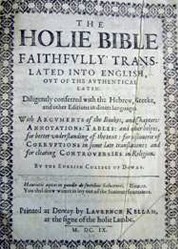Douay-Rheims Bible
From Textus Receptus
(Difference between revisions)
(→Other Catholic Versions) |
|||
| Line 1: | Line 1: | ||
{{Template:English Bible Versions}} | {{Template:English Bible Versions}} | ||
| + | [[Image:Bible de Douai - 1609.jpg|thumb|Douai bible - Old Testament (1609)]] | ||
The Douay-Rheims Bible is a Catholic translation of the bible from the Latin Vulgate into English. The New Testament was published in one volume with extensive commentary and notes in 1582. The Old Testament followed in 1609–10 in two volumes, also extensively annotated. The notes took up the bulk of the volumes and had a strong polemical and patristic character. They also offered insights on issues of translation, and on the Hebrew and Greek source texts of the Vulgate. The purpose of the version, both the text and notes, was to uphold Catholic tradition in the face of the Protestant Reformation which was heavily influencing England. | The Douay-Rheims Bible is a Catholic translation of the bible from the Latin Vulgate into English. The New Testament was published in one volume with extensive commentary and notes in 1582. The Old Testament followed in 1609–10 in two volumes, also extensively annotated. The notes took up the bulk of the volumes and had a strong polemical and patristic character. They also offered insights on issues of translation, and on the Hebrew and Greek source texts of the Vulgate. The purpose of the version, both the text and notes, was to uphold Catholic tradition in the face of the Protestant Reformation which was heavily influencing England. | ||
Revision as of 00:27, 9 January 2012
The Douay-Rheims Bible is a Catholic translation of the bible from the Latin Vulgate into English. The New Testament was published in one volume with extensive commentary and notes in 1582. The Old Testament followed in 1609–10 in two volumes, also extensively annotated. The notes took up the bulk of the volumes and had a strong polemical and patristic character. They also offered insights on issues of translation, and on the Hebrew and Greek source texts of the Vulgate. The purpose of the version, both the text and notes, was to uphold Catholic tradition in the face of the Protestant Reformation which was heavily influencing England.

